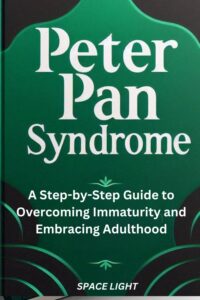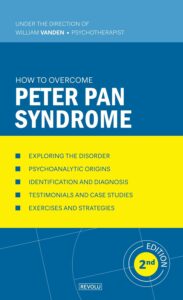Peter Pan Syndrome is a popular psychology term used to describe adults who struggle with emotional maturity and have difficulty taking on adult responsibilities. While not an official clinical diagnosis, this concept has gained traction in discussions about personal development and mental health.

The term draws inspiration from J.M. Barrie’s fictional character Peter Pan, a boy who never grows up and lives in the magical world of Neverland. Similarly, individuals described as having Peter Pan Syndrome often seem to resist the transition into full adulthood.
Key characteristics
People said to exhibit Peter Pan Syndrome may display several of the following traits:
- Avoidance of adult responsibilities
- Difficulty with commitment in relationships
- Lack of career focus or ambition
- Emotional immaturity
- Reliance on others for basic needs
- Difficulty with long-term planning
- Preference for fun and leisure over work and obligations
It’s important to note that these characteristics exist on a spectrum, and many people may exhibit some of these traits without necessarily having Peter Pan Syndrome.
Causes and contributing factors
While the exact causes of Peter Pan Syndrome are not clearly defined, several factors may contribute to its development:
- Overprotective parenting: Children who are shielded from challenges and responsibilities may struggle to develop independence.
- Fear of failure: The pressure to succeed can sometimes lead to avoidance of adult responsibilities altogether.
- Societal changes: Shifting cultural norms and economic factors may delay traditional markers of adulthood.
- Childhood trauma: Past experiences may hinder emotional growth and the ability to form healthy relationships.
- Personality traits: Some individuals may naturally be more inclined towards carefree or impulsive behavior.
Impact on Relationships and Daily Life
Peter Pan Syndrome can significantly affect various aspects of a person’s life:
Romantic relationships: Those with Peter Pan Syndrome may struggle with commitment, leading to a series of short-term relationships or difficulty maintaining long-term partnerships.
Career: A lack of career focus or ambition can result in job-hopping or underemployment, potentially leading to financial instability.
Family dynamics: Reliance on parents or siblings for financial or emotional support can strain family relationships.
Personal growth: Avoiding challenges and responsibilities may hinder personal development and self-actualization.
Mental health: The disconnect between societal expectations and one’s lifestyle can lead to anxiety, depression, or low self-esteem.
Addressing Peter Pan Syndrome
If you recognize these patterns in yourself or someone close to you, there are several strategies that may help:
- Seek professional help: A therapist or counselor can provide guidance on emotional growth and developing life skills.
- Set small, achievable goals: Start with manageable tasks to build confidence and a sense of responsibility.
- Practice self-reflection: Regularly assess your values, goals, and progress towards personal growth.
- Develop emotional intelligence: Work on understanding and managing your emotions and those of others.
- Build a support network: Surround yourself with people who encourage personal growth and accountability.
- Embrace adulthood positively: Focus on the benefits of maturity, such as increased autonomy and self-reliance.
- Address underlying issues: If childhood trauma or other deep-seated problems are present, work through these with a professional.
Criticisms and Controversies
It’s worth noting that the concept of Peter Pan Syndrome is not without its critics. Some arguments against it include:
- Lack of scientific validity: As it’s not a recognized clinical diagnosis, there’s limited research on its prevalence or treatment.
- Cultural bias: The expectations of adulthood can vary significantly across cultures, making a universal definition problematic.
- Gender stereotyping: Some argue that the concept reinforces traditional gender roles and expectations.
- Oversimplification: The term may oversimplify complex psychological issues and individual circumstances.
When to Seek Help
While everyone develops at their own pace, persistent difficulties with adult responsibilities can impact quality of life. Consider seeking professional help if you:
- Consistently struggle to maintain relationships or employment
- Feel overwhelmed by adult responsibilities
- Rely heavily on others for basic needs
- Experience anxiety or depression related to adulting
- Find it challenging to set or achieve long-term goals

Takeaway
Peter Pan Syndrome, while not an official diagnosis, describes a set of behaviors and attitudes that can hinder personal growth and fulfillment in adulthood. By recognizing these patterns and taking steps to address them, individuals can work towards a more balanced and satisfying adult life.
Remember, growing up doesn’t mean losing your sense of wonder or fun – it’s about finding a healthy balance between responsibilities and enjoyment. With self-awareness, support, and effort, it’s possible to embrace the positive aspects of adulthood while maintaining a youthful spirit.
If you’re concerned about Peter Pan Syndrome in yourself or someone you know, don’t hesitate to reach out to a mental health professional for guidance and support.
Hey there! We hope you love our fitness programs and the products we recommend. Just so you know, Symku Blog is reader-supported. When you buy through links on our site, we may earn an affiliate commission at no extra cost to you. It helps us keep the lights on. Thanks.
Disclaimer: The information provided in this discussion is for general informational and educational purposes only. It is not intended as medical or professional advice. Only a qualified health professional can determine what practices are suitable for your individual needs and abilities.


